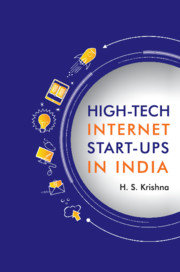Book contents
- Frontmatter
- Dedication
- Contents
- List of Tables
- List of Figures
- Preface
- Acknowledgements
- 1 Introduction
- 2 Objectives, Scope, and Methodology
- 3 High-tech Start-ups in India: Profile and Characteristics
- 4 Emergence of High-tech Start-ups
- 5 Survival of High-tech Start-ups
- 6 Growth of High-tech Start-ups
- 7 Factors influencing Life Cycle of High-tech Start-ups
- 8 Conclusions
- Bibliography
- Index
7 - Factors influencing Life Cycle of High-tech Start-ups
Published online by Cambridge University Press: 12 June 2019
- Frontmatter
- Dedication
- Contents
- List of Tables
- List of Figures
- Preface
- Acknowledgements
- 1 Introduction
- 2 Objectives, Scope, and Methodology
- 3 High-tech Start-ups in India: Profile and Characteristics
- 4 Emergence of High-tech Start-ups
- 5 Survival of High-tech Start-ups
- 6 Growth of High-tech Start-ups
- 7 Factors influencing Life Cycle of High-tech Start-ups
- 8 Conclusions
- Bibliography
- Index
Summary
Introduction
In this chapter, we discuss in detail, the factors that influence the life cycle of high-tech start-ups with respect to our total sample as a whole. Further, we ascertain the factors that are responsible for variance across the different life cycle phases of the start-ups involved in our study. To begin with, we will be specifically examining the factors that differentiate the start-ups among the three milestones of emergence, survival, and growth by way of MANOVA. We then study and identify the factors impacting the entire life cycle of start-ups by subjecting the entire data of start-ups to a multinomial regression. Further, we assess how high-tech start-ups differ between the three milestones in terms of their orientation towards the market segment that they target, the location in which they operate as well as based on the exposure of the founders.
The preceding chapters analysed the impact of entrepreneurial, firm-specific, and external environment-related factors that are influential in impacting the individual milestones of emergence, survival, and growth respectively. The focus of evaluation in those chapters was to understand what factors would help contribute towards attainment of the particular milestone under study. We grouped the data of our sample accordingly to examine each of the earlier objectives. However, in this chapter, we aim to supplement the insights obtained from the preceding chapters by enquiring if there are factors that influence the entire life cycle of high-tech start-ups. In other words, we wish to evaluate and understand whether there are factors in the entrepreneurial, firm-specific, and external environment-specific categories that pervade influence across all the key milestones of a start-up's journey. We consider the entire data of our sample to analyse this research objective. This insight would be useful for the entrepreneurs, ecosystem partners, and policymakers as well, who will then understand the key ingredients that are required to create, sustain, and grow successful high-tech start-ups.
In order to study the impact of factors affecting the life cycle of start-ups, we organize the data of start-ups that are collected during our study into three distinct categories based on their current status of the life cycle milestone achieved. The first category of start-ups would be those start-ups that have formally been incorporated, but who have not yet achieved the product-market fit.
- Type
- Chapter
- Information
- High-tech Internet Start-ups in India , pp. 171 - 205Publisher: Cambridge University PressPrint publication year: 2019



